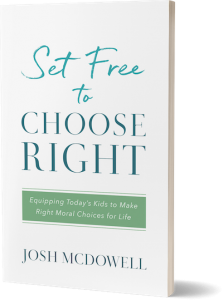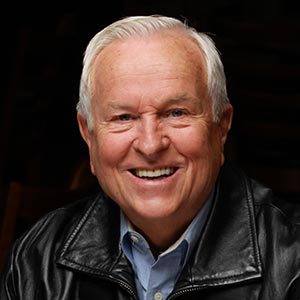
Perhaps you know this first-hand: parenting children to make right moral choices can be really tough.
You tell your kids the dos and don’ts — which you’ve put in place to guide and protect them — then watch in dismay when they choose to disobey. You sigh because you know what’s coming: you have to determine how best to discipline your kids without them adopting a defensive, rebellious attitude. “But everybody else’s parents let them do it!” they cry. “Or you’re just being mean. You don’t love me!”
Oy! What parent doesn’t cringe at hearing those words, as they recall memories of their saying the very words to their own parents? The easy route, of course, is to give in. But because we really do love our kids, we must set and enforce the rules and expectations we have for them. It’s a sad thing when parents give in simply because they’re worn out by the struggle of parenting a willful child. Let’s face it, this parenting stuff isn’t easy, even when you’re giving it your all.
Now a grandparent, Josh McDowell understands the challenge of raising kids in an increasingly secular world. In his new book, Set Free to Choose Right, Josh highlights some of the tough parenting issues through the use of two fictional parents, Brad and Audrey. Among other parenting issues, Brad and Audrey are struggling with how to get their teen son Jayden to understand the negative ramifications of his use of pornography. Brad and Audrey make some missteps in interacting with Jayden, but eventually succeed in opening his eyes to the consequences of a porn addiction.
Their secret to doing so? By clearly, and consistently interacting with Jayden without condemnation or shaming. In other words, they employ grace-filled parenting.
Readers of Set Free to Choose Right gain practical wisdom by watching how Brad and Audrey handle this issue, which can be applied to numerous other temptations enticing kids today. To succeed, Brad and Audrey first had to face some issues in their own thinking. Let’s look at those in a bit more detail.
Your child’s “who” isn’t determined by his or her “do” — just as your occasional missteps don’t define you. By parenting with grace, you can help your children to move past their bad choices, so they don’t cart them along as baggage into adulthood.
Brad and Aubrey have to see Jayden’s actions as being separate from his personhood.
One of the most powerful movie moments is a poignant scene between a father and his son in the movie Blood Diamond. The boy, previously kidnapped by a gang, was forced to do horrific acts of violence. “I know they made you do bad things,” says the father, as tears pour down his face. “But you are not a bad boy. I am your father, who loves you. And you will come home with me and be my son again.”
As parents, we must recognize that our children’s action are NOT a reflection on our character — just as our actions are not a reflection on theirs. And that sometimes our kids will do bad things, even if they don’t want or mean to. Loving with grace, then, is an intentional commitment to responding to our kids without judgment and anger. When we chose to not judge ourselves for the words and actions of our children, we are free to love them without judgement. “You’re a stupid kid!” then becomes “You have not made smart choices, but I am here to help you.”
An excellent parenting styles article, by Sarah Forbes on the Grace Under Pressure website, puts it this way: “Grace-filled parenting says, ‘I know it’s sometimes hard to obey. Sometimes, I struggle to obey and follow the authority over me. Let me help you practice obedience by training you.’”
Instead of condemning Jayden, his parents need to show that they identify with the pain that his wrong choice, if continued, will bring him.
What Jayden is doing is clearly detrimental to himself. But at the moment, Jayden can’t see any negative side of pornography. All he can see is the pleasure in it. But his parents clearly understand that an addiction to pornography will negatively affect Jayden’s view of sex and relationships. In her initial horror at finding Jayden watching online porn, Audrey tries to shame Jayden into feeling bad about his actions. Worse, she embarrasses her son in front of his dad.
Her goal: a quick fix that ensures no public embarrassment to herself. What would people think about her parenting abilities, after all, if they found out? Like many parents, Audrey’s immediate response has more to do with her saving face than it does with what’s motivating her son’s behavior.
What Jayden needs is to feel his parent’s heartfelt pain and concern over the negative consequences he will face down the road. He needs to recognize that he has acted outside of God’s protection and provision, which saddens his parents because they recognize that his choices are going to bring him suffering.
We can create all the rules in the world for our kids. But unless they know that our rules our motivated by our love for them, they won’t be highly motivated to obey us. Initially, Jayden thinks his parents are overreacting and trying to apply old fashioned thinking to his life choices. But as Brad and Audrey demonstrate that their primary concern is that his behavior will hurt him, Jayden becomes more open to listening to them. He finally comes to understand that habitually watching porn will not only rewire and damage his brain, but distort his view of women and God’s gift of sex. The worst part is that it will bring a lot of baggage and false expectations into any future dating relationships, if not marriage.
Brad and Aubrey need to love Jayden with grace, which means making Jayden’s security, happiness, and welfare as important as their own, and not holding his mistakes against him.
That is what grace-filled parenting does; it stays focused on the child’s well-being, which includes accepting his or her mistakes. Mistakes, after all, is how we learn and grow.
I actually wince when I hear a parent hiss, “You’re embarrassing me!” Worse, if the hiss is accompanied by violence, say a slap or rough arm jerk, I actually get nauseas. Because I recognize that so much lasting damage is done to children when we communicate with them in anger.
Frustration at having to repeatedly deal with the same issue does get old. But we have to remember that parenting is a 24/7 commitment. Doing it right means leaning heavily on Christ, and following His grace-first example. We have to give our kids room to make mistakes. After all, we’re not perfect, either. “The graceless home requires kids to be good and gets angry and punishes them when they are bad,” writes author Tim Kimmel. “The grace-based home assumes kids will struggle with sin and helps them learn how to tap into God’s power to help them get stronger.
Adds Kimmel, “Grace understands that the only real solution for our children’s sin is the work of Christ on their behalf. . . . Legalism uses outside forces to help children maintain their moral walk. Their strength is based on the environment they live in. Grace, on the other hand, sees the strength of children by what is inside them—more specifically, who is inside them.”
Forbes, in the same Grace Under Pressure article we mentioned earlier, puts it this way: “Grace-filled parenting says, ‘I’m going to love this child unconditionally – without him having to be good enough. Just like the father of the Prodigal Son, this child is always welcome back home. If the child rebels, I’ll be sad but not angry, knowing how many times I have rebelled against God and how much I’m undeserving of His unconditional love and acceptance. No matter what this child does, I’ll continue to be Jesus to him and love him back to Christ.’”
Brad and Aubrey need to recognize that Jayden is listening, and as such they have considerable influence on him — even if he acts like he doesn’t hear a word they say.
Love wrapped in grace empowers kids to look at rules in a fresh and positive way. As we all know, most kids don’t naturally consider the rules they’re given to be in their best interest. Rather, they see rules as restrictions on their freedom. But as they experience rules within the context of a loving relationship proven to care about their best interest, they are set free to respond positively.
A lot of parents fear that they have little influence on their kids. They think school, their children’s peers, and the media have way more influence than they do. But they would be wrong! Studies have shown that kids, whether they act like it or not, are closely watching and listening to their parents.
A national online study shows that 45 percent of young people consider their parents to be their role models. Other studies show that 32 percent of today’s kids look to their friends and just 15 percent look to celebrities for guidance and inspiration. In fact, the studies show that even until your children reach twenty-five years of age, the greatest influence on their behavior will be the loving, close relationship with their parents, especially their dad.
With that in mind, then, the challenge is to be the best parental role model that you can be. Never forget that every word you speak and every action you take is being observed by your kids. To be an effective parent, then, align your parenting with God’s Word, and be ready to defend God’s truth against a culture that daily entices your children to stray from God. If you need to take anger management classes, do it. If you need to take effective communication classes, do it. And take full advantage of Christian-based parenting books and videos, many of which are widely available on the Internet. Consider adding Set Free to Choose Right to your arsenal of available parenting resources.

Set Free to Choose Right by Josh McDowell
Whether dealing with sexuality and pornography or honesty and self-control, equip your children with a biblical foundation to know why right is right and wrong is wrong. They can learn to make smart choices, to avoid many pitfalls in life.
Pick up your copy to gain the wisdom in this helpful parenting resource.













